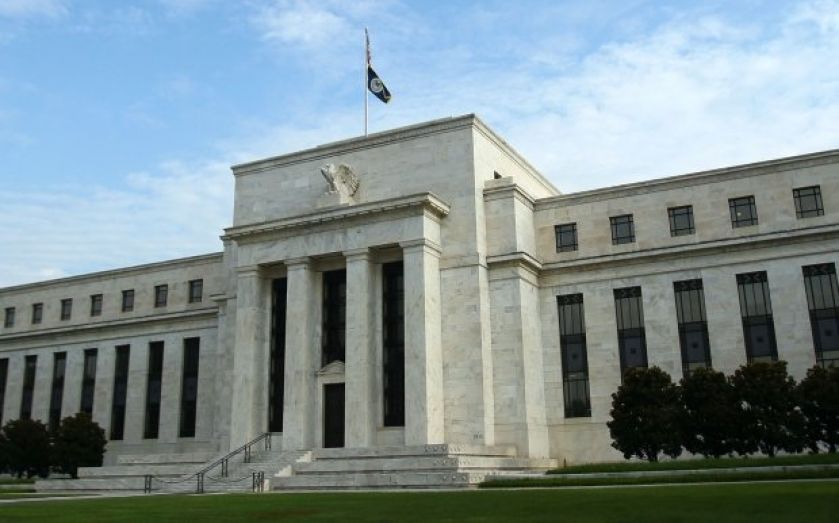The Federal Reserve has finally released minutes from its 2008 meeting

The minutes from the 16 September 2008 meeting of the Federal Open Market Committee have finally been made public.
That meeting took place the day after Lehman Brothers went bust. Then Federal Reserve chairman Ben Bernanke sums up the mood pretty well:
Obviously, we started late. We have a lot to talk about.
Bernanke didn't want to put a limit on tools they might use, in fact, he was happy to suggest that some pretty heavy duty weaponry might be appropriate:
I would like to put on the table a request for authorization for swap lines. I prefer not to put a limit on it, so I know I’ve got my own bazooka here. [Laughter]
Here's how the the market reaction just before the meeting was summed up:
Just to give you a snapshot of what has happened since Sunday evening, stocks are down worldwide—4 percent plus everywhere. Yesterday, the U.S. stock market was down about 4½ percent, and S&P futures indicate a lower opening today.
As you might expect, there has been a big flight to quality, especially into the Treasury bill market. Ten-year Treasury note yields fell about 30 basis points yesterday, and there has been a big rally throughout the Treasury curve. The big thing, where there has probably been the most severe stress in the market, is in dollar liquidity for foreign banks.
As you remember, foreign banks, especially in Europe, have a structural dollar funding shortfall, and they look to execute foreign exchange swaps or borrow in the dollar LIBOR market to fund that. There was significant upward pressure in that market—overnight LIBOR rates today were 6.44 percent—and that pressure in Europe is leaking over into our market.
Yesterday the federal funds rate opened at 3 to 3½ percent. Despite our doing a $20 billion repo at our normal 9:30 a.m. time, the upward pressure on the funds rate yesterday continued. It rose to as high as 6 percent in the late morning, and that is why we came in with a second operation of $50 billion around noon yesterday.
Obviously some people were spending a lot of time at work during the crisis, Dave Stockton refers to his living habits in the days before the meeting:
I don’t really have anything useful to say about the economic consequences of the financial developments of the past few days. I must say I’m not feeling very well about it at the present, but I’m not sure whether that reflects rational economic analysis or the fact that I’ve had too many meals out of the vending machines downstairs in the last few days. [Laughter]
Here's the FOMC's take on developments in China:
MR. SHEETS. Yes. Yesterday the PBOC cut its main policy rate 27 basis points. I guess they felt that 26 would not have been enough and 28 would have been too much. [Laughter] And 27 was just the right number. I’d say a couple of thoughts were there. One important point is that inflation in China has decelerated significantly. In the spring they were looking at twelve-month inflation rates of around 8.3 percent. The latest reading for August was 4.9 percent. So it’s clearly on a decelerating trajectory. That has been driven by a marked decline in food prices. Earlier this So the deceleration in prices; some concerns about where activity is going, particularly in the aftermath of the Olympics; and signs of slowing external demand have given them the scope they need to cut policy rates. Besides the cut in monetary policy, we’re also hearing reports that the authorities are poised to implement fiscal stimulus if that’s necessary.MR. FISHER. Thank you.CHAIRMAN BERNANKE. Three is a lucky number in China. Don was going to tell you that 3 cubed is 27. [Laughter].MR. KOHN. He was also going to wonder, Mr. Chairman, whether we needed to harness the mystical powers. [Laughter]CHAIRMAN BERNANKE. I think we have good feng shui here.MR. SHEETS. The science of monetary policy.CHAIRMAN BERNANKE. Any other deep questions for our colleagues? I’m a little surprised.MR. PLOSSER. We’re all trying to be brief, Mr. Chairman.CHAIRMAN BERNANKE. Everyone has been very brief. I’m shocked. [Laughter]
As to the current financial predicament, I want to go back to a comment I made a long time ago.This is not the first for me. I like to tease President Stern about his maturity—I don’t go back to the Panic of 1890, but to Herstatt, 1974; New York City’s failure, 1975; 1987; and what happened in Japan. Incidentally, you see the same pictures repeated in every newspaper. It’s always the trader holding his head or looking up at the board.Now it’s in color; it used to be black and white. I think it comes from the same archive, and it is repeated throughout time. [Laughter]